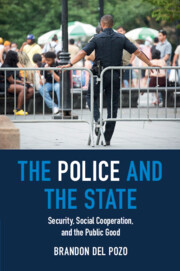Book contents
- The Police and the State
- The Police and the State
- Copyright page
- Contents
- Introduction
- Chapter 1 The Role of the Police
- Chapter 2 The First Power of the Police
- Chapter 3 The Second Power of the Police
- Chapter 4 The Third Power of the Police
- Chapter 5 Democratic Priorities, Relationships, and Tensions
- Chapter 6 The Bases of, and Reasons for Seeking, Police Legitimacy
- Chapter 7 Procedural Justice in Policing Revisited
- Chapter 8 Policing with Public Reason
- Chapter 9 Policing Populism, Protecting Pluralism
- Chapter 10 Primary Goods, Policing States in Transition, and Natural Experiments
- References
- Index
Chapter 10 - Primary Goods, Policing States in Transition, and Natural Experiments
Published online by Cambridge University Press: 17 January 2023
- The Police and the State
- The Police and the State
- Copyright page
- Contents
- Introduction
- Chapter 1 The Role of the Police
- Chapter 2 The First Power of the Police
- Chapter 3 The Second Power of the Police
- Chapter 4 The Third Power of the Police
- Chapter 5 Democratic Priorities, Relationships, and Tensions
- Chapter 6 The Bases of, and Reasons for Seeking, Police Legitimacy
- Chapter 7 Procedural Justice in Policing Revisited
- Chapter 8 Policing with Public Reason
- Chapter 9 Policing Populism, Protecting Pluralism
- Chapter 10 Primary Goods, Policing States in Transition, and Natural Experiments
- References
- Index
Summary
This chapter argues that we can consider policing either a primary good, subject to the requirements of distributive justice, or a feature of the democracy necessary for creating and distributing primary goods secure from threats of populism, majoritarianism, and crime. It uses historical examples of failed states and states in transition to observe that a reduction in government to policing actions and the emergence of a dominant protective association demarcate transitions between states, and become the overriding priority in cases where states falter or fail, highlighting policing as a necessary, core feature of the conception of the state itself, regardless of how minimal that state may be (or how extensive it may become). The chapter closes by considering the potential for a Rawlsian difference principle to guide the distribution of police resources to benefit the least well off, and the utilization of public health metrics and outcomes to ensure policing delivers practical justice by seeking equitable population-level reductions in morbidity and mortality, and increases in health and resilience, rather than relying on crime rates or police productivity as surrogate indications that policing has positively impacted communities and their most vulnerable members.
Keywords
- Type
- Chapter
- Information
- The Police and the StateSecurity, Social Cooperation, and the Public Good, pp. 203 - 221Publisher: Cambridge University PressPrint publication year: 2022

